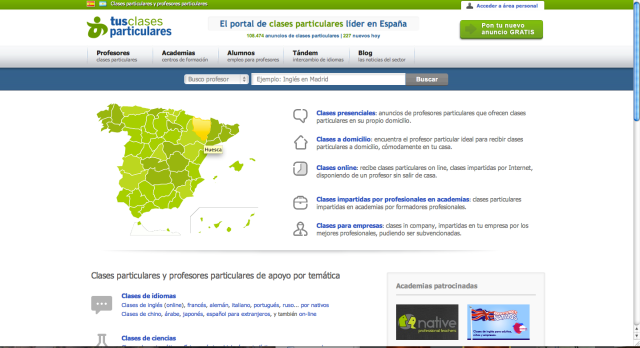1. This is your ticket to living legally in Spain.
For anybody who’s ever studied abroad in Spain, or Europe, or anywhere — or for anybody who just really enjoys traveling and living in foreign countries — this is a great way to get a visa and a legal job in the EU. Those Schengen visas are notoriously hard to come by, but the requirements for this program are pretty basic. Essentially, all you need is to be a native English speaker; have finished at least the third year of your undergrad; not have something horrible on your background check; and you’re good to go.
Another convenient thing about the Auxiliares program is that it’s directly through the Spanish government. You work for the government, so there’s no chance that you’ll have a problem with your work/student visa being denied. Plus, you don’t need to pay any fees to a third-party company, as is an option with study abroad or other volunteer abroad programs, to become an Auxiliar. The only fees you encounter for the program are the ones you need to get your visa.
2. This is not study abroad.
I studied abroad twice in college, so when I was looking forward to my year in Spain, I thought I’d have no problem moving to a new country on my own. But this is so different from study abroad, because it’s for such a long period of time. Most students who study abroad do so for a semester or a summer, but I will be in Spain for 10 months without going back to the States. You miss family. You miss friends. You miss loved ones. You realize that you are moving to a foreign country where you know literally nobody, and unlike study abroad there isn’t a program in place for you to instantly make 50 new friends who are in the same situation as you. It can be lonely, no lie.
In the same vein, because you work directly through the government and there’s no program behind you, you don’t have much help with things in general. Auxiliares have no assistance with housing, so when we all arrived in Spain, we stayed in hostels and scoured Spanish apartment listings on the Internet for days to find a place to live. We made cold calls in Spanish trying to find an apartment, and we went and saw usually quite a few places before finding one that clicked; my search ended up with me living in a hostel for 14 days. There is, of course, the option to pay a program provider about $2,000 to give you some sense of support, but in my opinion they don’t really do much for you and it’s a waste of cash — but that’s another story.
Not to be a Debbie Downer, but the truth about missing “home” more strongly than ever before is the most important advice I can give to anyone considering the program.
3. You’ll learn a lot of Spanish. But you also won’t be allowed to speak Spanish.
So rule #1 of being an Auxiliar is, we are not allowed to speak in Spanish while in the schools. Ever. This is the most important rule, and you get in big trouble if you break it. The thinking is that if the Spanish students know that we English teachers can speak Spanish, they will stop trying to speak English at all — so to them, we don’t even know what “Hola” means.
This is actually the toughest part of teaching the kids. So many times, the kids are so close to expressing what they want to say in English, and I want to be able to just give them that last word because I know what they’re saying in Spanish — but we have to hold our tongues. Plus, most of my kids and their parents think I’m pretty dumb — I know this because I can understand them when they talk amongst themselves about me in Spanish! — because I’ve been living in Spain for 4 months and still apparently don’t speak a word of the language.
It can also make for some interesting situations. Most of the teachers at my school who don’t teach English don’t speak any English at all, so I’ll have conversations with them at lunch in Spanish. One time, I had a 20-minute convo with the gym teacher at lunch; five minutes later, when I’m gathering my students, he continues it, in Spanish. Because I was with my students, all I could do was look at him and say, “Hey, I don’t speak any Spanish, sorry” while he just looks at me like what in the world, we were just talking for 20 minutes! Then there are other things like the fact that my principal doesn’t speak English, but I’m not allowed to speak Spanish. Or the time that I was having a conversation on the streets in Spanish, and the kid walking in front of me turns around, and it turns out he’s one of my students, and he’s going nuts saying “Tú hablas español, tú hablas español!!”
That being said, you will be speaking so much Spanish outside of the school, you still definitely get plenty of practice with the language. From going through the apartment search, to jumping through the hoops of getting legal residency here; from day-to-day activities like finding a park or ordering a beer, to living in a piso where you primarily speak Spanish — you can put yourself in a situation where you’re practicing the language at all times, if you try hard enough to make it happen. You can also live with all English speakers and never speak castellano, if that’s what you want. For me, I’ve moved closer to Spanish fluency than I’ve ever been before. I’m truly thinking and dreaming in Spanish now, and it’s awesome.
4. The Spanish classroom is different from the American classroom.
My fellow teachers at the school always ask me, how are Spanish schools different from American schools? The main thing I notice, is that there just seems to be less respect from the students here in Spain. For instance, no matter what activity I’m doing in class — reading from a workbook, copying vocabulary, quiet-time drawing — there is ALWAYS at least one or two kids talking amongst themselves! And it’s just the norm here. I tell them to be quiet, and literally one second later they’re back to talking.
I’ve heard stories from other Auxiliares in secondary schools, that there’s a good deal of back-talking from Spanish students to the profes. And even in my fifth grade classes, plenty of students curse at me in English! For example, I’ll say, “OK guys, turn to page 27 in the workbook,” and one will reply, “I’m not f****** doing that s***.” I don’t think they quite comprehend what they’re saying, but it still seems pretty rude. I think this particular trend exists because Spanish curse words like “joder” are tossed around all day even by kids; when I told my teacher I work with that the students are continually cursing in English, she just said, yea, that’s what they do — and that was the end of that conversation.
Not to say the kids are completely disobedient, but if there’s one difference between American classes and Spanish ones, it’s gotta be the respect issue.
5. You can live on 1000 euros a month in one of the biggest cities in Europe.
The money situation was one thing that scared me a bit before actually coming across the pond: How in the world I am going to live in one of the biggest cities in the world on the equivalent of only $1,300 a month? But it’s really not that bad, if you’re smart about it.
I pay about €350 in rent and utilities monthly, and I live 10 minutes walking from Puerta del Sol, the very main center of Madrid. I go out a few nights every week, and with that €1,000 I’ve been able to make about one trip outside of Madrid a month. Day-to-day life in Spain is actually pretty affordable. You can get a kebab for €3, a week’s worth of groceries for about €20. Menú del día, or a two-course meal with drink, bread, and coffee/dessert, goes for about €9-12. My rent here is actually cheaper than it was in South Carolina! Just be smart with your money — I don’t eat out all that often — and you’ll be pleasantly shocked at how far €1,000 will get you.
Note that only the Auxiliares in Madrid receive €1,000 a month. Everywhere else in Spain, the monthly pay is €700; but in most places the rent is at least halved from the prices in Madrid, and daily things like groceries are much cheaper as well.
6. But you need to be a motivated self-starter if you want to really live the traveler’s life.
Let’s be honest. If you’re lucky enough to have a ticket and a visa to live in Europe for a year, you want to do as much jet-setting and country-hopping as you can. Traveling is cheaper in Europe than in the U.S., but you still can’t afford that many trips on €1,000 a month. The way to supplement that income and to travel everywhere you want to go, is by giving English classes in private.
As Auxiliares in Madrid, we only work 16 hours per week (everywhere else in Spain, it’s 12 hours a week). That gives us a lot of free time to find other work, but our options are fairly limited: We don’t have work visas (they’re technically student visas) and most of us aren’t fluent in Spanish (bye-bye, waiting tables option). But, there is a huge demand for native English speakers to give private English lessons to people in their homes or in academies, and there’s plenty of money to be had there.
There’s a wealth of ways to find private English classes (“clases particulares”) in your city — by talking to parents of your students at school, word of mouth from one of your private students to a friend, posting flyers around your neighborhood. I’ve found the easiest way is to post an ad on one of the many websites created specifically to match English teachers to English students; one of the best, in my opinion, is tusclasesparticulares.com.
I’ve just started my first private class, and most of my Auxiliar friends make an extra €100-200 monthly through their private classes. I know some Auxiliares who make up to €500 extra per month. And although it is always nice to have that extra income, don’t start teaching too many classes — you want to still leave yourself enough time to actually spend that cash and enjoy it!
The Auxiliares program is an incredible, convenient job option for travel enthusiasts, and it brings a world of opportunities with it. There are pros and cons to being an Auxiliar, but those come with every job –and at least with this one, you get to deal with them while living in Europe.






This was so great! Thank you for sharing (: I’m a first year in the program and still waiting on my city and school placement so I’ve been scouring blogs and different websites about any information i can find!
Thanks for the compliment! Great to hear that you’re coming into the program, it’s really been a blast and I’ve gotten everything that I wanted out of it. Please don’t hesitate to contact me if you have any questions about the program!
I enjoyed reading it too! Thank you for creating this :) Can’t wait to receive my official acceptance letter, too. Could you tell me about where to get fingerprinted and how to get them certified with the apostille of the hague?
Thanks for the compliment, Curtis! The requirements about getting the fingerprints and the apostille vary by each state; for South Carolina, I went through the SC Office of the Secretary of State, and it wasn’t too difficult. I think that’s more or less how it goes with most states, but def check with your own state’s policy. Hope that helps man!
Hey Amit! I’m about to start this program in Madrid in a matter of weeks. I’ve just graduated as a teacher in Melbourne and to be honest I’ve been debating whether or not I should still go. I must say that after reading this I feel somewhat reassured that going to Madrid might be the right decision after all! Thank you so much for posting this :)
Algunos buenos consejos! It’s refreshing to hear some advice from a guy’s perspective in the program. I really look forward to applying for it in November, but it seems like a lot of auxiliares are girls. Not a bad thing, it’s good to hear good news from both guys and girls. Me, the only thing right now stressing me out is the VISA process
Gracias Ryan! I actually found there to be a pretty even mix of guy and girl auxiliares, at least in my city of Madrid, although I’d agree that most of the popular auxiliar blogs are by girls. You’ll meet a ton of great people through the program.
Visa process is pretty stressful, not gonna lie. In my experience, the consulates have always been strict in their requirements, but if you have everything good to go the consulate usually handles things pretty quickly. Once you get that visa, you’l be all set!
¡buena suerte con el visado, y con todo en españa!
Hey Amit. Thanks for the insight! Just wondering, did you hear about your acceptance via email or did you have to keep checking the profex site? I know the deadline to accept is soon after if you receive a placement and I don’t want to miss out if I’m not constantly checking the site. Thanks!
Hi Cait! Agreed, the deadline to accept is tight, 5 days after receiving placement I believe. For this reason, I was neurotically checking the profex site anyway just to be sure I didn’t miss it. But I just double-checked in my email and I did indeed receive an email about the acceptance, subject line “Adjudicación de plaza” from the Ministry in early May of my year. It included instructions on how to accept the placement within 5 calendar days.
Hope that helps, ¡que te vayas bien!
Great, thanks for the response!
Reblogged this on adriftbetweenworlds.
Hi there, this is a really great article, came across this by accident! I have lived in Madrid working as an English teacher for 2 years now, but this summer I had to return to the UK to stay with my mum waitressing whilst saving my ticket to get back to my Madrid life! Unfortunately, I’ve been held up getting back while I wait for a new passport to come through (mine got pick pocketed in Madrid…) and looks like I won’t be back in time for beginning of school term time. Do you have any idea if schools will still take in Auxiliares de conversacion mid term, say half way through October or beginning of November? I appreciate your time :)
Hi, thanks for your compliment! Anecdotally, I have heard of the Ministry continuing to give rolling auxiliar placements until about November as they fill the last spots. I’ve also heard that there’s a fair-sized exodus of auxiliares who leave for Christmas vacation back home and just don’t come back to españa; so, I have heard of a case or two where the Ministry has granted new auxiliar positions in January. But again, this is all anecdotal, I would take it all with a large, kosher grain of salt.
My advice would be to email the Consjería in Madrid directly (en español y inglés si es posible). Explain your situation and your 2 years of experience as an auxiliar, how your passport is on the way, and you’re wondering if there are still any auxiliar positions open. If you applied for the program in spring, give them your inscrita #; if not, just see what the possibilities are. Hope this helps!
Hola, hola Amit! I plan on applying to the Los Auxiliares de Conversacion program for the 2015-2016 school year and am pretty nervous about the application process (getting a placement and also, the application process). Could you tell me a little bit more about the application- Proflex (issues you might have had, when did you find out when the application would go out, how to navigate the system, etc.)?
I mean the 2016 to 2017 school year- my apologies
Loved this article! How early did you apply? I just realized applications drop in 3 days for me, and i’m really interested in doing this. How long was the whole process for you?
Hi Janelle! Many apologies for the very delayed response. I’d say from the day I submitted my application to the day I was accepted into the program, it was about 4 months. There were some intermediary steps — another post of mine (https://amitinespana.wordpress.com/2013/09/12/it-takes-a-lot-of-steps-in-order-to-get-to-spain/) detailed these. If you have any further questions after glancing through that article, just let me know and I can provide you my email!
Never letting the assistants use English, even outside the classroom, just sounds utterly bonkers to me, I would always insist that the students try first in English, but never just doesn’t work, as you say, it makes their parents think you’re an idiot and not a good role model and they feel able to talk behind your back. I found letting the kids know I could speak French when in France, actually much more helpfull and it was easier for having a working relationship with them. Sometimes you need to give instructions or say that you really aren’t pleased with their behaviour, and you can do that much more effectively in their language. Generally, people like using a mixture of their native and the target language when they are learning too.
That would actually be a reason for me not to want to go on the programme, though I guess as an EU citizen it’s easier for me to get work full stop, unlike Americans who need a work visa. If it’s an English only policy in the classroom, that is one thing and I’d happily go along with it, but outside when you’re talking to them in the corridors, that’s just way too much. As you said, it actually caused a lot of difficulties for you. I think 16-18 year olds especially are old enough to know that they should be getting enough out of the assistant as possible.
It sounds like they seriously just can’t keep discipline, if they can’t get over to students that they are there to practice their English during the classroom, then they really are just failing. Many private language schools actually get their teachers to do conversation exchange with their students, outside of lessons.
It’s actually good for students to see that people can successfully learn to speak other languages.
.
Hi lovely insight. I really want to do a program like this. I’m from the Caribbean. Island of trinidad and Tobago. Are there any restrictions when it comes to the Caribbean? I kno some others where it’s for US citizens. Please help. Id love to travel and this program will be a great start
Great post, this actually makes me miss the program so much! I just did two years and kind of wishing I was there for a third!